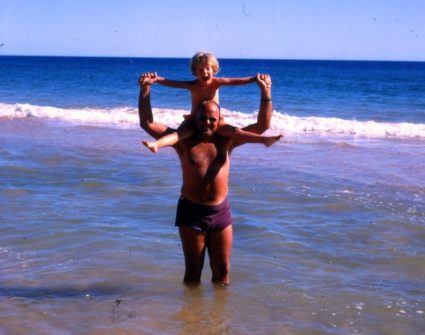
In 2022, there were nearly 33,000 estimated cases and researchers project that cases will rise to more than 36,000 by…

Our March pick for the PBS NewsHour-New York Times book club "Now Read This" is Dani Shapiro's "Inheritance." Become a member of the book club by joining our Facebook group, or by signing up for our newsletter. Learn more about the book club here.
Years after her dad died, Dani Shapiro found out he was not her biological father. But she had long sought to better understand him through her writing before that moment.
"My dad died before he had a chance to be proud of me. That has been one of the driving forces of my life as a writer. To make him proud, after the fact," Dani told the PBS NewsHour about her father, Paul Shapiro.
Among the works that Shapiro penned for the father who raised her was a 1998 essay called the "Secret Wife," about with her discovery that he had been wed to a woman who died just six months after they married. "When I discovered as a teenager that he'd had a wife I'd never known about…I always longed to know more about that time in his life," wrote Shapiro.
Still, she writes in "Inheritance" that even after writing deeply about her father, there was something she "could never quite fathom" about her relationship with her parents. She had examined her whole life via writing, but still did not know the truth about herself.
In this annotated passage from her memoir, Shapiro writes about how comparing two DNA tests led her to uncover a family secret that "flooded every corner" with the truth she had sought her entire life as a writer.
I thought I understood my father's sorrow. I had written deeply on the subject, not only in The New Yorker but also in several of my books. Finally, I came to accept that I had learned all I could learn. That he had been unhappy was without question. But at least I had been able to build a monument to him, a stack of stories, essays, memoirs, novels that I wrote in his honor–my own, secular form of kaddish. I knew all about his tyrannical, exacting father; his capricious first wife; the loss of his great love; the bitterness of his marriage to my mother.
But there had been something more–something I could never quite fathom. An invisible live wire stretched between my parents and me. Touch it, and we all might go up in smoke. I knew this, too, though I couldn't have articulated it. I had turned away from fiction, toward memoir, as if a trail of words might lead me there. All the while, I wondered: Why did it matter so much? After all, my parents were long dead. I had survived them. I had built a life. I had a family of my own. Whatever their secrets, they were now buried, lost to history. My latest book was the first of my memoirs that had nothing to do with my parents.
It turns out that it is possible to live an entire life–even an examined life, to the degree that I had relentlessly examined mine–and still not know the truth of oneself. In the end, it wasn't words but numbers I stared at disbelievingly on a computer screen that smashed down the door and flooded every corner, every crevasse, with a blinding light: Comparing Kit M440247 and A765211.
All my life I had known there was a secret.
What I hadn't known: the secret was me.
This excerpt comes from pages 34-35.
Sustain our coverage of culture, arts and literature.